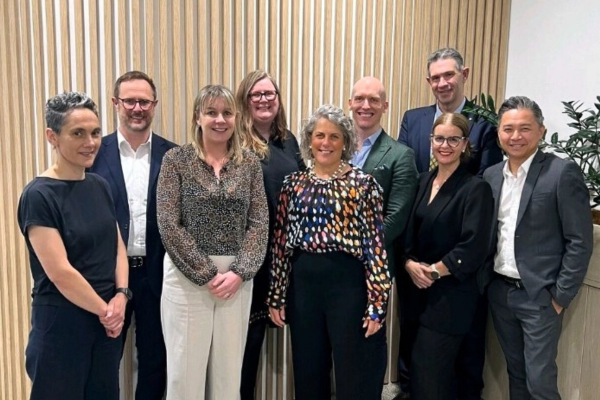 “As our members and workforce become increasingly trans-Tasman, it is critical we stay connected, solving our collective challenges and leveraging our collective opportunities together.
“As our members and workforce become increasingly trans-Tasman, it is critical we stay connected, solving our collective challenges and leveraging our collective opportunities together.
“Like us, Australia is citing its highest level of infrastructure investment (at Commonwealth level) and the construction and infrastructure sector is struggling with many of the same issues – workforce and insurance challenges, a slowdown in work with no clear view of the forward pipeline of work, and increasing compliance costs, among other things.
“Discussions put a central focus on culture as key to unlocking productivity, growing our workforce, and innovation, the need for transformative attraction and retention policies and stressing the important role procurement can play in incentivising culture change and innovation.
“We can be proud of our leadership through The Diversity Agenda and Mindspace, which provide platforms for mature and impactful conversations to attract and retain talent in our sector, ahead of where our counterparts in Australia are. We can learn from the ACA’s work on its Culture Standard, which sets to embed the principles of ‘time for life’, ‘diversity and inclusion’ and ‘wellbeing’ into procurement as a lever for change with positive results in the five pilots so far.
“As we deal with generational attitudes and expectations regarding study and work, our opportunities lie in reimagining career pathways into engineering as young people want less time in graduate study and swifter movements into the workforce, and to better understand the value of adaptability as the next competitive talent advantage over and above EQ and IQ as we need a workforce that won’t know what is coming next but will need the skills and innate ability to face it. There were also positive reflections on the work of European countries to offer bridging courses into engineering including from non-engineering undergraduate degrees as something to explore.
“Two call-outs to the sector really resonated and are particularly relevant as we all struggle with where we are as a sector right now. We were reminded that ‘collaboration always trumps genius’, and we all have the ability to influence change. We need to keep informed, challenge the status quo, and push the industry forward together.”
Seven tips from the trip
- As our Infrastructure Commission looks more closely at a 30-year infrastructure strategy for New Zealand, it was interesting to hear from Infrastructure Australia about the three iterations they have gone through to get to where they are today. Key feedback was not to lose sight of the “customer” in this work, that we need to understand each other’s roles and remit in the ecosystem and to stay focussed. Infrastructure Australia is now less focussed on being a “think tank” and more on how it can tangibly inform Australia’s planning and prioritisation for infrastructure, including new success in providing advice into Cabinet before decisions are made, more rigour around their priority list and upfront work on the viability of projects that are put forward for that list, and alignment to their infrastructure policy statement. It was interesting to hear that the pipeline and priority list has not been a “silver bullet” for the sector, and they still struggle with market uncertainty.
- Infrastructure NSW, which has a key role in providing independent advice to the NSW Government as well as in delivering projects on behalf of the Government, has a ten-point plan, which is a commitment to the construction sector and underpinned by a range of principles including domestic manufacturing and supporting the local market, safety and wellbeing, culture and diversity, improving financial sustainability across the sector, boosting productivity including through modern methods of construction, efficient procurement and digitalisation, and decarbonising to achieve net zero targets.
- Australia operates in a much more litigious environment than us, which serves as a reminder of the importance of our work to sustain the use of standard form contracts and collaborative and non-defensive environments.
- Australia has a reliance on overseas trained engineers, with around 60% of their workforce not domestically trained.
- There were a lot of comments about where and how New Zealand has stood out in terms of our sector leadership, including policy innovation, diversity and inclusion, wellbeing and culture.
- The lack of women in the industry is holding us back. Improving culture is the key to unlocking productivity, growing our workforce, and innovation. To solve these issues, Government and the sector must work together.
- We need to harness data for a more productive future. This includes having a strong data governance framework, understand bias in your data, analising data through the 5 Vs (volume, value, variety, velocity, and veracity) and removing data silos from your organisation and industry.
